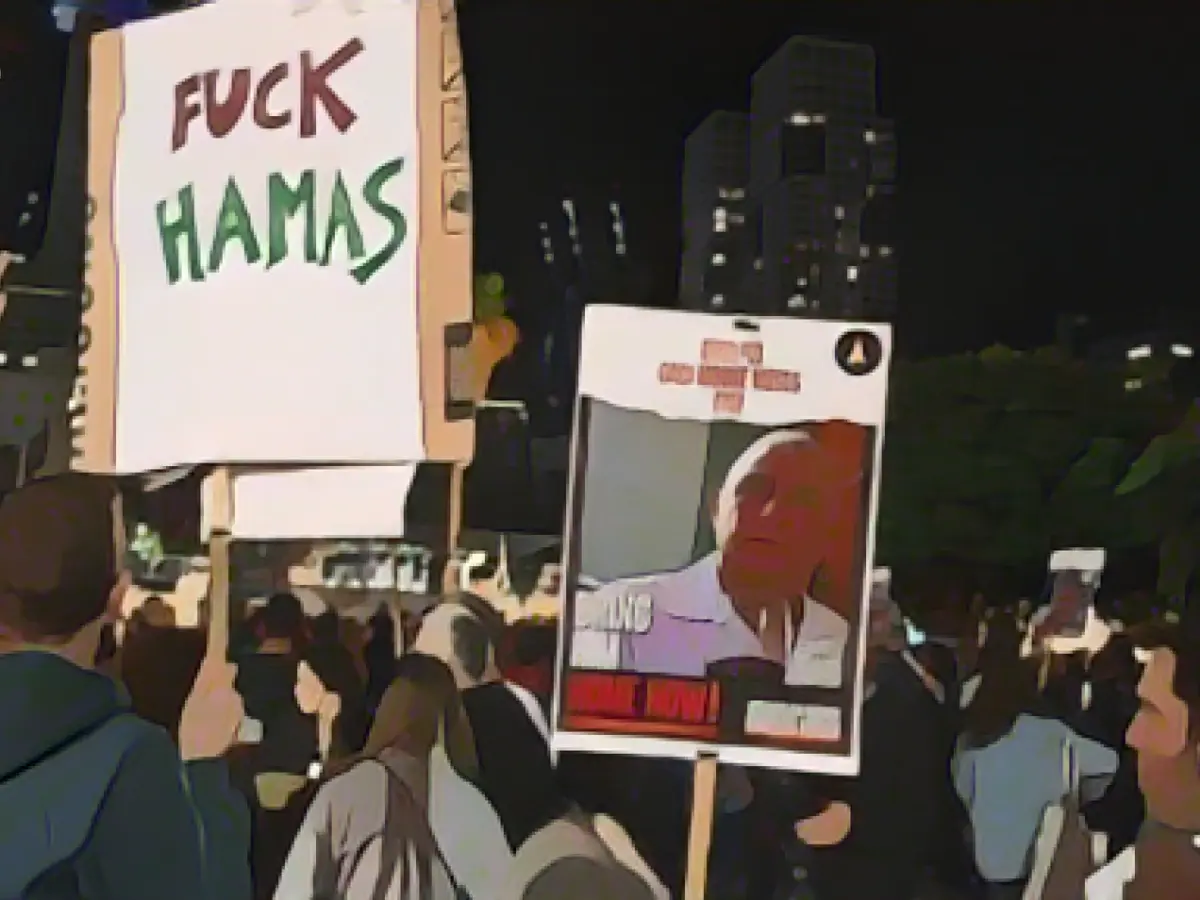Headline: Netanyahu Stands Firm on Pressure Tactics Against Hamas, Calls for Negotiations
In the wake of a tragic accidental shooting of three hostages by Israeli soldiers in Gaza last week, families of the missing and captured, including Noam Perry whose father, Haim Perry, remains in Hamas's custody, have intensified their calls for the government to act. "We're receiving dead hostages again and again," Noam stated during a Tel Aviv gathering for hostages and missing families. She urged the Israeli government to put forth an immediate plan for negotiations with Hamas, emphasizing it as a plea any concerned parent would make.
Premier Benjamin Netanyahu expressed sympathy towards the heartbreaking tragedy, describing it as something that "broke the heart of the nation." He underscored the necessity of continuous "military pressure" on Hamas to drive negotiations in a productive direction, stating that any negotiations without that pressure yielded little to no results.
Despite the recent incident, media reports suggest that the Israeli government is steering back towards negotiations, possibly due to the tragic loss of life in Gaza. Sources hint at an arranged meeting scheduled between Israeli Mossad Director David Barnea and Qatari head of government Mohammed ben Abdelrahmane Al-Thani this weekend. The meeting's primary focus is rumored to be a potential second ceasefire aimed at freeing remaining hostages.
Looking back to earlier in November, Israeli and Hamas negotiations, facilitated by Qatar, Egypt, and the United States, resulted in the release of around a hundred hostages. In exchange, Israel freed approximately 240 Palestinian prisoners from its prisons. The agreement, however, left 129 individuals still in Hamas's hands.
The ongoing conflict between Hamas (classified as a terror organization by the EU and US) and Israel spans ten weeks, during which Hamas forces invaded Israeli towns on October 7th and committed unspeakable acts against civilians. Over 1130 people died, and around 250 were taken hostage in the Gaza Strip, according to Israeli sources.
In response, Israeli forces targeted the Gaza Strip with air attacks and launched a ground offensive. The death toll currently stands at around 18,800, as reported by the Hamas-controlled Ministry of Health, although this figure is unverifiable.
Related Articles:
Insights:
- Upon reviewing the situation, Benjamin Netanyahu remains steadfast on the utilization of "military pressure" on Hamas, establishing a solid foundation for any potential negotiations.
- Persistent calls for immediate negotiations echoed by Noam Perry and other families of hostages fall not as a fight, but as an appeal for diplomacy.
- Given the escalating tensions, the Israeli government seems to be revisiting the route of negotiations, preferring a peaceful solution to address the unresolved hostage issue.
- Reports of an upcoming meeting between Israeli Mossad Director David Barnea and the Qatari head of government Mohammed ben Abdelrahmane Al-Thani suggest the potential for a second ceasefire to facilitate the release of hostages.
- The possibility of resuming negotiations has been hinted at, although Netanyahu himself did not explicitly commit to discussions with Hamas.
- Notably, the earlier November ceasefire deal, brokered by international mediators and Israel, saw the liberation of roughly 100 hostages in exchange for 240 Palestinian prisoners, highlighting the potential for diplomacy. However, more than 129 hostages still remain captive by Hamas.
SOURCE:
Enrichment Data Incorporated:
- Netanyahu has consistently advocated for a hardline stance against Hamas while upholding the release of all hostages taken during the October 2023 attack.
- A lasting ceasefire remains fragile due to various challenges, including the uncertain political future of the Gaza Strip, the Israeli government's desire for retribution, and disagreements over the release of remaining hostages.
- The active involvement of international leaders like Donald Trump and his envoy, Steve Witkoff, have been instrumental in maintaining the ceasefire, as well as in pushing for further negotiations to secure hostage releases.
- U.S. mediation continued to play a pivotal role in the ongoing negotiations and, depending on the negotiation's success, could potentially influence the future of the region.








